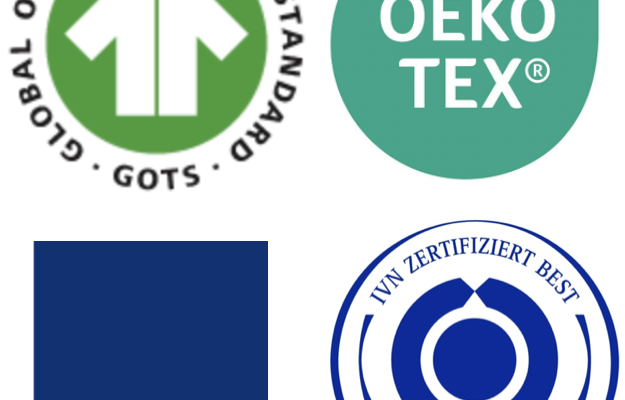Throughout my blog, I reference products that may have a certification. The information below is for reference, to provide further background on each type of certification mentioned, in case a reader is not very familiar with one or more.
I think this website does a great job explaining the differences between Oeko-Tex, GOTS, and bluesign certifications, but here is a high level description of each:
Oeko-Tex certified: OEKO-TEX® certified products have been tested for harmful substances to protect consumer health. The label certifies that every component of the product, from the fabric to the thread and accessories, has been rigorously tested against a list of up to 350 toxic chemicals. Note that OEKO-TEX certified products are not always organic – it also includes synthetic materials. There are five types of Oeko-Tex certifications:
- STANDARD 100 by OEKO-TEX®: Independent OEKO-TEX institutes conduct extensive lab tests on every product component to verify that the contained chemicals are harmless to the consumer. The standard measures concentration against limit values for more than 100 substances including heavy metals, pesticides, formaldehyde, PFCs, banned azo colorants, etc.
- OEKO-TEX Leather Standard: This certification is for leather products and is the equivalent to the STANDARD 100.
- OEKO-TEX STeP (Sustainable Textile & Leather Production): This certification covers the entire production chain for textiles and leather. It evaluates production facilities and certifies that they are employing best practices in environmental and social management (worker safety and socially responsible working conditions).
- OEKO-TEX Made in Green: This certification is a combination of OEKO-TEX 100 and OEKO-TEX STeP in that it assures both safety for the consumer and environmental and social standards in the production process.
- OEKO-TEX Eco Passport: All chemicals, colourants and auxiliaries used for the manufacture of textiles and leather materials have been tested for harmful chemicals to standard concentrations.
GOTS certified: The Global Organic Textile Standard (GOTS) is a worldwide leading textile processing standard for organic fibers, including ecological and social criteria, backed up by independent third-party certification of the entire textile supply chain. Being GOTS certified helps to distinguish from companies who use greenwashing. All steps in the processing, manufacturing and trading of organic textiles are covered by GOTS and includes everything from the chemical inputs being used to the ethical treatment of workers. A textile product carrying the GOTS label must contain a minimum of 70% certified organic fibers, while a product with the label grade ‘organic’ must contain a minimum of 95% certified organic fibers.
Ideally, a product that is both OEKO-TEX and GOTS certified is the best option, as the two together ensures not only the safety of the product for the health of the consumer, but also that ethical and sustainable standards were met throughout the entirety of the cotton manufacturing process.
Bluesign: Similar to OEKO-TEX, bluesign tests products for harmful chemicals. Brands are allowed to use the Bluesign® PRODUCT label if they contain at least 90% Bluesign® APPROVED textiles and 30% Bluesign® APPROVED accessories. The difference between Bluesign and OEKO-TEX is that Bluesign APPROVED means that the product was produced in environmentally and socially responsible ways, whereas OEKO-TEX 100 does not cover environmental and social production (STeP and Made in Green do). The other difference is that Bluesign APPROVED fabrics doesn’t mean the entire product is free from harmful chemicals – they may have other components like zippers, buttons, etc.
IVN (Internationaler Verband der Naturtextilwirtschaft e.V.) – IVN is one of four members of the International Working Group for the Global Organic Textiles Standard (GOTS), and also has developed two quality seals of its own: Naturtextil IVN certified BEST and Naturleder IVN certified. These two seals are responsible for safeguarding and reviewing the entire textile production chain to ensue they meet ecological and social standards. Naturtextil IVN certified BEST is a standard for eco-friendly textiles with the strictest requirements for ecological textile production at the highest technical levels. Only a select range of products can meet this standard and the minimum requirement for this certification is the Global Organic Textile Standard (GOTS). It addresses all production stages from raw material to sale and the use of the finished leather (not the finished leather products). Naturleder IVN certified is a standard for eco-friendly leather products in Europe. Audits are conducted by independent and specially accredited certifiers on the basis of the monitoring system defined by IVN.
